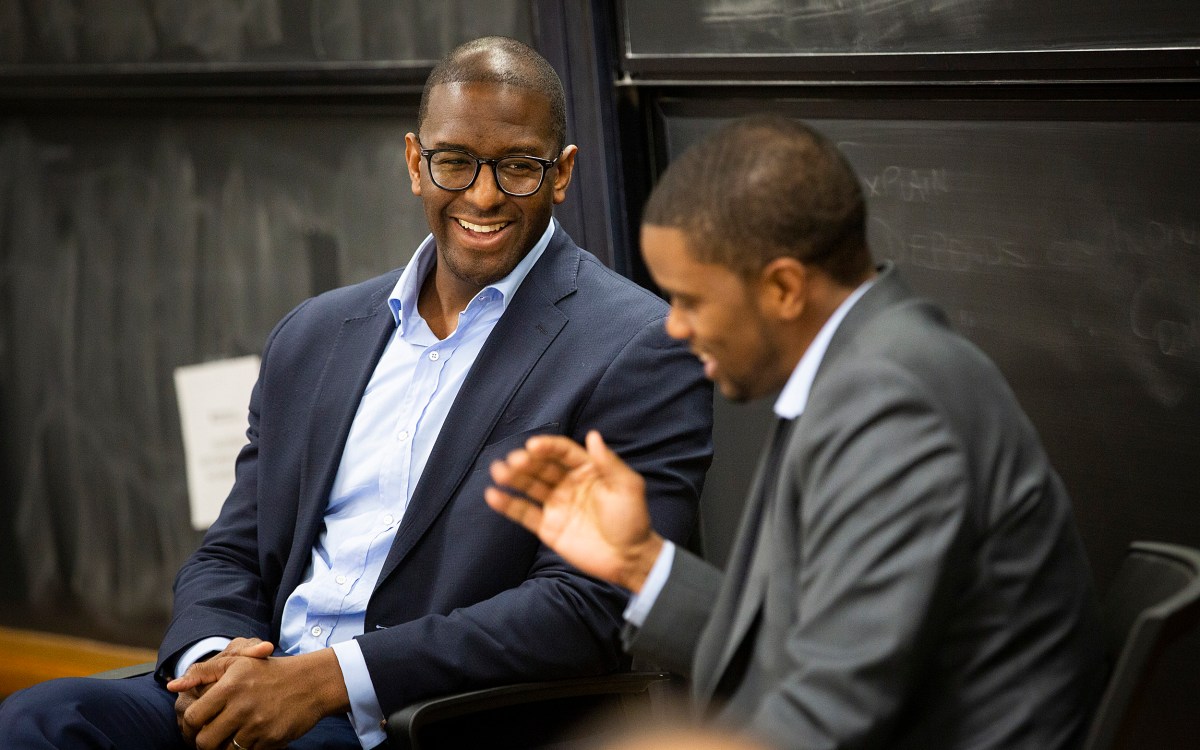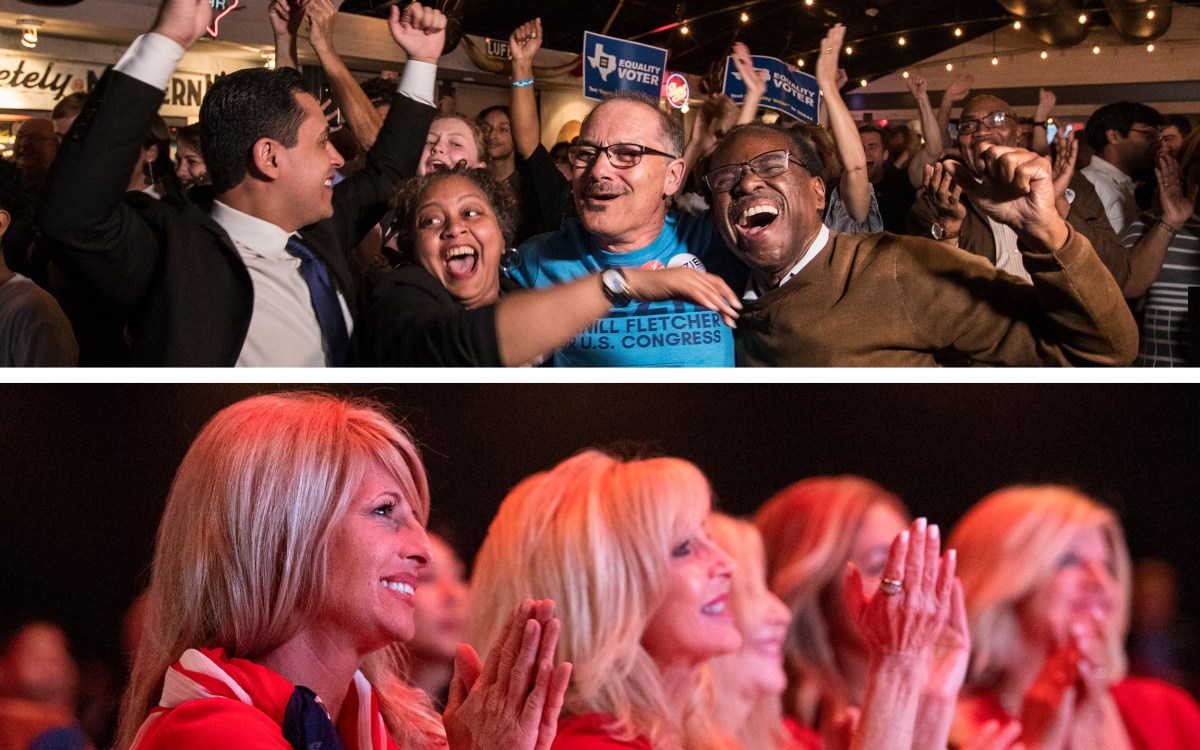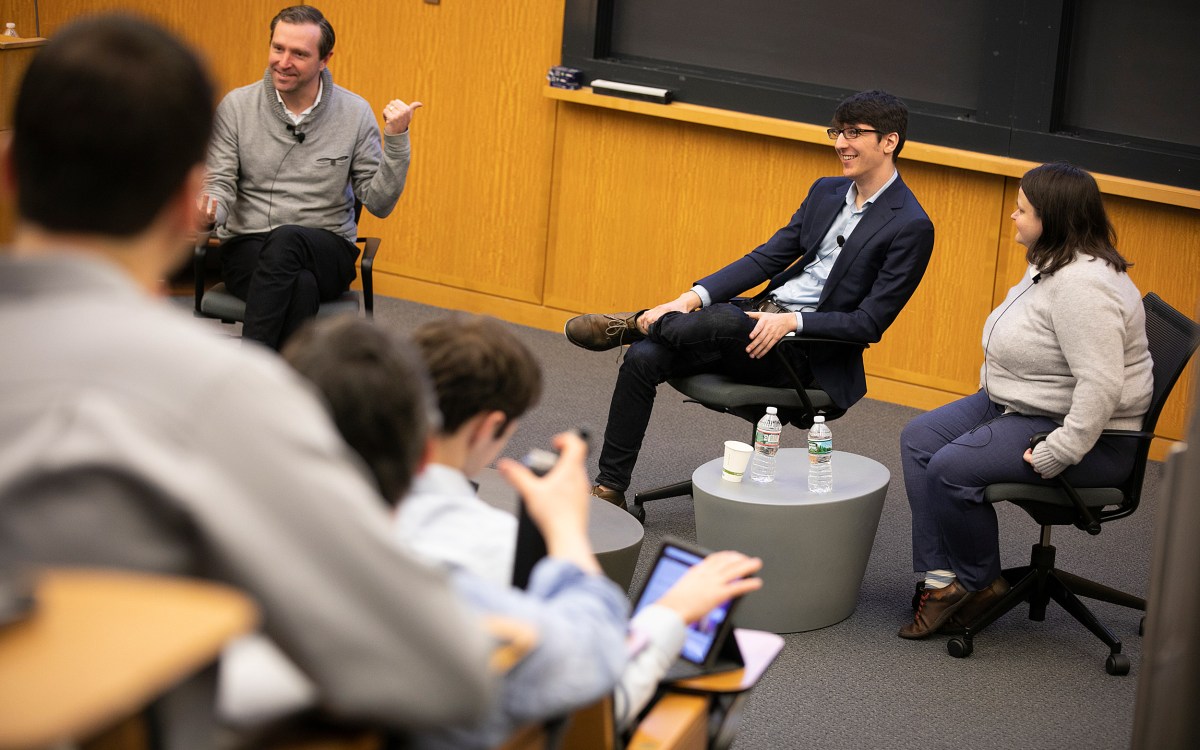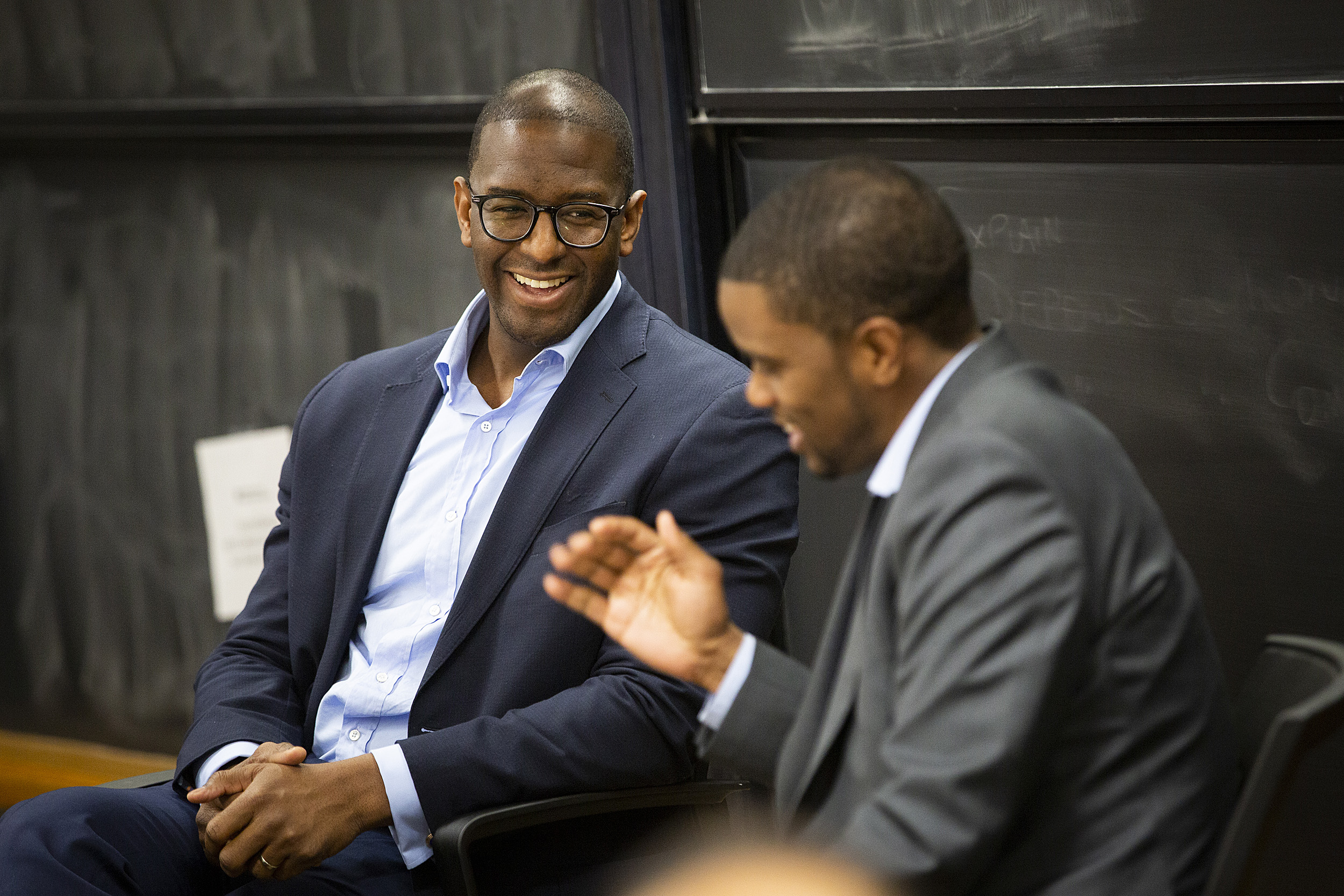
Andrew Gillum, who ran an energizing gubernatorial campaign in the 2018 midterms, is leading a study group at the Institute of Politics.
Photos by Stephanie Mitchell/Harvard Staff Photographer
Lessons from a gubernatorial loss
Harvard fellow Andrew Gillum, who almost won Florida’s governorship, talks partisanship, race, and how to attract voters
In a historic 2018 election that saw a record midterm voter turnout, a record number of women elected to office, and a Democratic landslide in the House of Representatives, the Florida gubernatorial race between Tallahassee Mayor Andrew Gillum and Republican Congressman Ron DeSantis, J.D. ’05, was among the most closely watched and closely contested.
A young African-American with a progressive political message, Gillum quickly became a rising star on the national Democratic scene during a contest tainted by racist appeals, gracefully handling the slings and arrows sent his way. President Trump even threw his considerable influence among Florida’s conservative voters behind DeSantis. But after 8 million votes cast, and a state-mandated recount, Gillum lost by just over 32,000 votes.
Now, a Resident Spring Fellow at the Institute of Politics, Gillum leads a study group and hopes to expand student notions of how to drive change in democracy today.
The Gazette spoke with Gillum about what Democrats in 2020 should learn from his narrow defeat, the role race played in motivating voters on both sides, and whether he sees himself getting back in the electoral game.
Q&A
Andrew Gillum
GAZETTE: Your candidacy excited many people around the country, and not just because Florida is a swing state. Were you surprised at how much attention the contest, and you as a candidate, garnered nationally?
GILLUM: I didn’t know that until after. While we were in the middle of the race, with the exception of when the president would weigh in, when I was moving around, I didn’t have the luxury of reading clips or any of that other stuff. It didn’t, in the moment, feel as big as it felt toward the last couple of days. When you compare the attention our race got in the primary to what Stacey [Abrams] was experiencing in Georgia, we were not really on the radar in the same way. And I get why. It felt a little bit different for us partly because nobody really thought we were going to win the primary. Once we got through the primary, it took a different life of its own, but that’s also the final two months of the race. Florida has got one of the latest primaries.
It surprised me after our second debate, which was [only on Florida] television, but because of the race thing that came up, it just exploded. That felt very present to me because I would show up at my rallies and people had quotes from the debates on shirts and they were selling them. It sort of took on a life of its own. I guess in some ways, I’m thankful that I wasn’t as aware in the moment, because I think it would’ve been an added pressure. It would’ve been tough.
GAZETTE: Remarkably, just over 32,000 votes separated you and DeSantis after the state-mandated recount. What do you believe were the decisive factors?
GILLUM: The University of Florida produced a study in 2017 that showed for ballots that are rejected because of mismatch of signature, seven of 10 are people of color. If you’re in a rural county in Florida, it wouldn’t matter if your signature didn’t match; they know you, or the presumption is much more in your favor than against you. But in Miami-Dade [County], Broward [County], Hillsborough [County], Orlando — I’m not even suggesting that it is so much the race of the person as much as it is that these are big places and they’re more diverse, urban communities, and so the impact is more disproportionate. They’re also areas where you go in and you sign your signature, the clerk could challenge — “This isn’t your signature” — and they could move your ballot to provisional. And now, we’ve just had another federal judge say basically, “This signature ballot thing is a crock. It’s horrible and you’ve got to change it.”
GAZETTE: So the signature mismatch provision was a reason?
GILLUM: Clearly in the end. But going into the race, it’s hard to pinpoint just one thing in a state as big as Florida is. But if I had to go by the numbers, it would be that in Miami-Dade County, one of the more Democrat-rich counties, we underperformed Barack Obama and Hillary by percent of turnouts. Turnout was up, but in Miami-Dade and Broward, Barack Obama and Hillary Clinton outperformed me by 4 points. Had we been able to move 1 more point up, it could’ve more than erased the 32,000-vote deficit that we saw. If I had to wonder why Miami-Dade [turnout was low], I would probably say the “socialist” hit was a big one. It didn’t make sense to me in the moment, and I didn’t think it was actually going to stick because if you look at my record, that’s not what it is. But the concentration on “socialism,” particularly on Hispanic radio, was impactful.
“My hope is that people don’t make the conclusion that because we didn’t win, that we should go back to where we once were.”
GAZETTE: Many people felt your opponent and his camp made a number of racist appeals to voters during the campaign, and yet he prevailed. Do you find that disheartening, or is his razor-thin margin of victory a positive sign?
GILLUM: I was disappointed, there’s no doubt about it. And I wasn’t sure that the play was going to work. But then, obviously, in the final analysis, while we may have moved a million more voters out, so did they. Trump had a 49 percent approval rating in my state on Election Day and they won with 49 percent. For as diverse a state as Florida is, we also have a lot of Midwesterners and others who are retiring to the state. Every little bit of progress that we may get by virtue of increasing diversity is eaten up in our state by older, whiter, and more conservative voters coming into the state. And so, [DeSantis’ campaign] had it right. It’s unfortunate, but the play was probably the best they could have [made] given what the circumstances were at that time.
But I will also say I’m not disheartened, because in spite of how bad all of that was — and we didn’t even get the whole picture; what got covered wasn’t the whole of what was happening. The text message campaign was crazy! And as the saying goes, “A lie makes it around the corner when the truth is just backing out of the driveway.” The chasing we did of some of the text stuff was incredible. But in spite of all of that, we saw record numbers in a lot of our targeted categories turning out and impacting the race, I think, for the positive. So all is not lost in Florida, in other words.
GAZETTE: Did the FBI investigation and ethics questions it raised about you damage your campaign more than you had anticipated it would?
GILLUM: It was probably the most annoying part. It was ever-present all the way through, and it allowed them to go to certain underlying biases that served their purpose. Do I think it had an impact? I think it did. How big of one is hard to say when you’re talking about the numbers we’re talking about: a difference of 32,000 votes out of 8 million cast. It’s hard to say if one thing did it. But I will tell you, as someone who values very much my own personal integrity and had my family and my mother watching these commercials, it was very hard, because it speaks to your character.
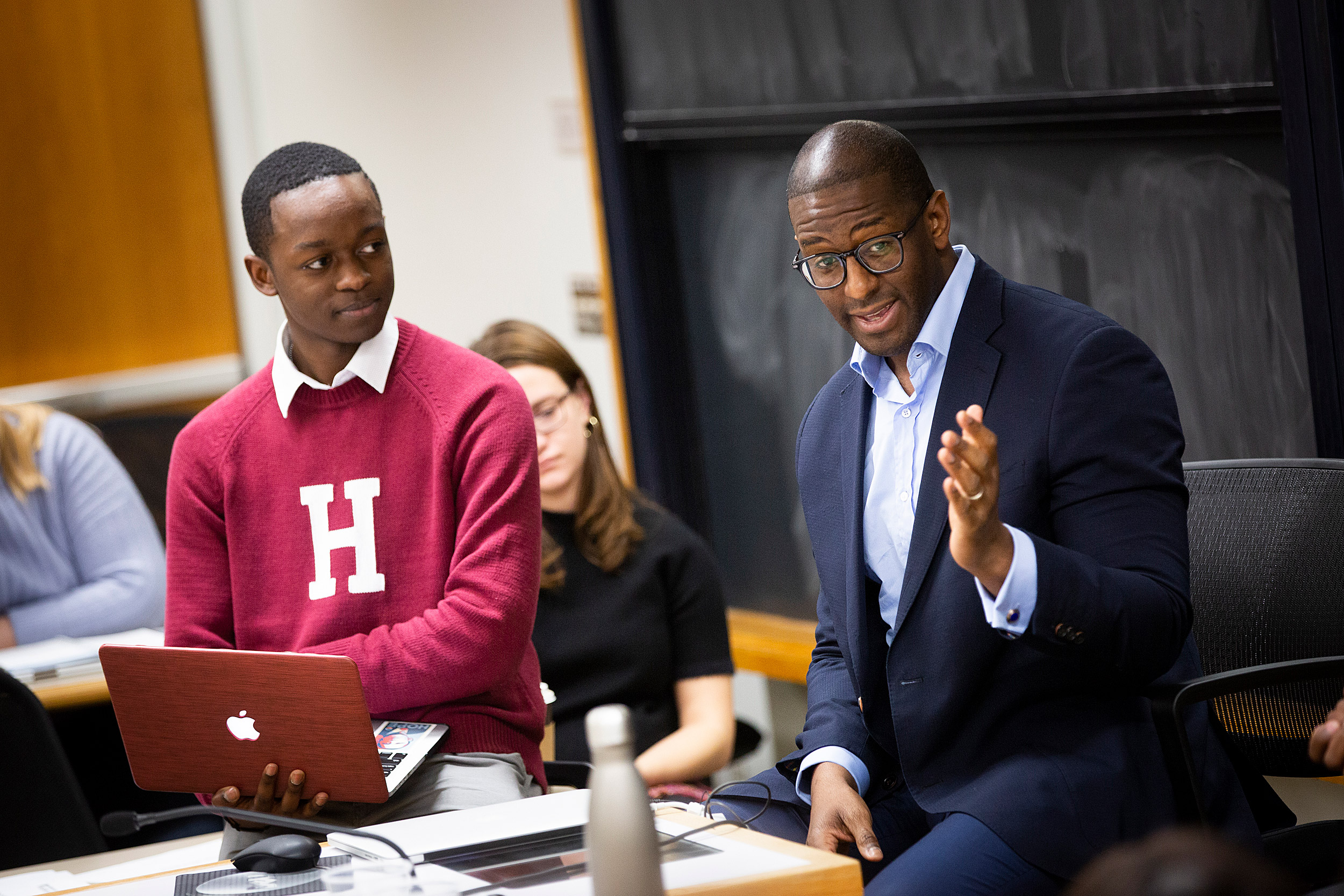
GAZETTE: You ran on a clear progressive message in a very divided state. If you, Beto O’Rourke, and Stacey Abrams had won, people would’ve declared centrist Democrats finished. What lessons did you personally take away from the election, and what do you think Democrats should learn from it as we head into 2020?
GILLUM: One, I’m reminded that you do have to compete everywhere. We had to move our numbers up among our folks across the state. And we had varying levels of success; we largely moved them up, but so did they. The campaign joked that maybe in the last three days I shouldn’t have been in the rural panhandle reminding people I was running for governor [laughs]. The belief that the limits of a progressive message are only in urban areas, I think is a myth. I think you can have that message and talk everywhere about it and demystify it for people in some ways. Because if it can be trumped up to “Oh, that’s just socialism” to believe that people ought to have access to affordable health care — well, let’s talk about what that means for you and be willing to go there with folks. I do think we busted the myth that you’ve got to run to the right in order to win in states like ours, especially in all three cases — Beto, my case, and Stacey. In my case, we got closer than any Democrat in 20 years in the run for governor. And so, if the other way was going to work, why didn’t it work before? My hope is that people don’t make the conclusion that because we didn’t win, that we should go back to where we once were. I hope that the numbers would suggest that isn’t necessarily the way to go.
If I have something to share with folks who are running in the next presidential election, I’d say I do think we have to be careful with race, continuously, certainly for candidates of color. That it is still a third rail, and it is still very difficult to talk about. And it’s particularly difficult to address in a substantive enough way for people who really do feel like they get the biggest brunt of the negative impact of racism, while at the same time signaling to white people that you don’t hold them accountable for every bad thing that is done by a white person. I don’t know that I got all of it right. I definitely think that my comment, “I’m not calling him a racist, but the racists think he’s a racist” probably had as much of a motivating effect for his people as it did for mine. The going theory within our camp was “You can’t call him a racist” and “We’ve got to tread lightly with it,” in spite of how present it was. I had a different opinion about it and I went with my gut, and I don’t know if it was to the help or to the hurt.
GAZETTE: You’re here at the IOP leading a study group about what democracy looks like in an era of rapid change and unprecedented threats. What will you be focusing on and what do you hope students will take away from their time with you?
GILLUM: I want people to know I was a local government person for 15 years, and before that I was an organizer. The reason I chose “what democracy looks like” as part of our theming is because it’s very easy to think that you’ve either got to be the candidate or to compete at high levels of political office to impact our democracy, when the truth is that there are so many ways in which you can engage — whether it’s through local government, maybe as a statewide elected official, but also, what role do activists play, organizers, what role do artists play, artists-as-activists? Who are the disrupters right now in American politics who contribute to changing systems, society, people, community, states, a country, a world? My hope is that young folks will leave here believing that there are a lot of theories of change on how you impact the process, elected office being one of them, but all of these other ways are also important and, we’ll show, highly effective.
GAZETTE: You told your supporters on election night that you were “not going anywhere” and that you would “continue to work on their behalf.” How will you do that? What’s next for you?
GILLUM: I made a commitment to a million voters, to include new registrants and those reengaging in the process. What I mean by “those reengaging” are the 2.6 million who are registered and did not exercise the right to vote. The only way this real change happens electorally is if people get out there and exercise the right to vote. So, along with a number of groups in the state, we’re going to commit to this million goal for 2020 to flip Florida blue.
GAZETTE: Will you run for office again?
GILLUM: I don’t know, but I can tell you this: I know that I’m probably not done.
This interview has been edited for clarity and length.



